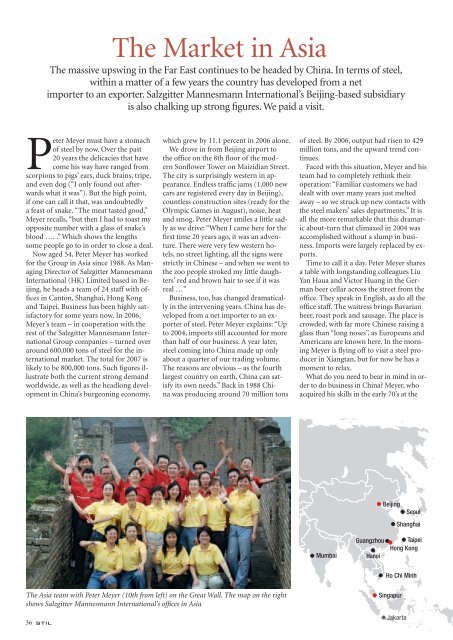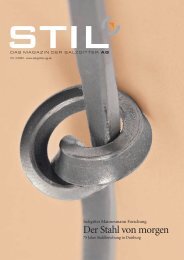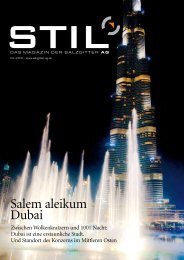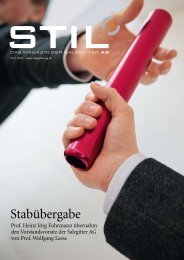Dr. Heinz Jörg Fuhrmann - Schau Verlag Hamburg
Dr. Heinz Jörg Fuhrmann - Schau Verlag Hamburg
Dr. Heinz Jörg Fuhrmann - Schau Verlag Hamburg
You also want an ePaper? Increase the reach of your titles
YUMPU automatically turns print PDFs into web optimized ePapers that Google loves.
Peter Meyer must have a stomach<br />
of steel by now. Over the past<br />
20 years the delicacies that have<br />
come his way have ranged from<br />
scorpions to pigs’ ears, duck brains, tripe,<br />
and even dog (“I only found out afterwards<br />
what it was”). But the high point,<br />
if one can call it that, was undoubtedly<br />
a feast of snake. “The meat tasted good,”<br />
Meyer recalls, “but then I had to toast my<br />
opposite number with a glass of snake’s<br />
blood …. .” Which shows the lengths<br />
some people go to in order to close a deal.<br />
Now aged 54, Peter Meyer has worked<br />
for the Group in Asia since 1988. As Managing<br />
Director of Salzgitter Mannesmann<br />
International (HK) Limited based in Beijing,<br />
he heads a team of 24 staff with offices<br />
in Canton, Shanghai, Hong Kong<br />
and Taipei. Business has been highly satisfactory<br />
for some years now. In 2006,<br />
Meyer’s team – in cooperation with the<br />
rest of the Salzgitter Mannesmann International<br />
Group companies – turned over<br />
around 600,000 tons of steel for the international<br />
market. The total for 2007 is<br />
likely to be 800,000 tons. Such figures illustrate<br />
both the current strong demand<br />
worldwide, as well as the headlong development<br />
in China’s burgeoning economy,<br />
The Market in Asia A junk pictured<br />
The massive upswing in the Far East continues to be headed by China. In terms of steel,<br />
within a matter of a few years the country has developed from a net<br />
importer to an exporter. Salzgitter Mannesmann International’s Beijing-based subsidiary<br />
is also chalking up strong figures. We paid a visit.<br />
which grew by 11.1 percent in 2006 alone.<br />
We drove in from Beijing airport to<br />
the office on the 8th floor of the modern<br />
Sunflower Tower on Maizidian Street.<br />
The city is surprisingly western in appearance.<br />
Endless traffic jams (1,000 new<br />
cars are registered every day in Beijing),<br />
countless construction sites (ready for the<br />
Olympic Games in August), noise, heat<br />
and smog. Peter Meyer smiles a little sadly<br />
as we drive: “When I came here for the<br />
first time 20 years ago, it was an adventure.<br />
There were very few western hotels,<br />
no street lighting, all the signs were<br />
strictly in Chinese – and when we went to<br />
the zoo people stroked my little daughters’<br />
red and brown hair to see if it was<br />
real …”<br />
Business, too, has changed dramatically<br />
in the intervening years. China has developed<br />
from a net importer to an exporter<br />
of steel. Peter Meyer explains: “Up<br />
to 2004, imports still accounted for more<br />
than half of our business. A year later,<br />
steel coming into China made up only<br />
about a quarter of our trading volume.<br />
The reasons are obvious – as the fourth<br />
largest country on earth, China can satisfy<br />
its own needs.” Back in 1988 China<br />
was producing around 70 million tons<br />
The Asia team with Peter Meyer (10th from left) on the Great Wall. The map on the right<br />
shows Salzgitter Mannesmann International’s offices in Asia<br />
of steel. By 2006, output had risen to 429<br />
million tons, and the upward trend continues.<br />
Faced with this situation, Meyer and his<br />
team had to completely rethink their<br />
operation: “Familiar customers we had<br />
dealt with over many years just melted<br />
away – so we struck up new contacts with<br />
the steel makers’ sales departments.” It is<br />
all the more remarkable that this dramatic<br />
about-turn that climaxed in 2004 was<br />
accomplished without a slump in business.<br />
Imports were largely replaced by exports.<br />
Time to call it a day. Peter Meyer shares<br />
a table with longstanding colleagues Liu<br />
Yan Haua and Victor Huang in the German<br />
beer cellar across the street from the<br />
office. They speak in English, as do all the<br />
office staff. The waitress brings Bavarian<br />
beer, roast pork and sausage. The place is<br />
crowded, with far more Chinese raising a<br />
glass than “long noses”, as Europeans and<br />
Americans are known here. In the morning<br />
Meyer is flying off to visit a steel producer<br />
in Xiangtan, but for now he has a<br />
moment to relax.<br />
What do you need to bear in mind in order<br />
to do business in China? Meyer, who<br />
acquired his skills in the early 70’s at the<br />
Salzgitter Stahl trading company in<br />
Düsseldorf, before spending three years<br />
working for the Group in London, doesn’t<br />
need to think twice: “Someone once said to<br />
me here in China, ‘Even if you cannot understand<br />
one another, it is important to<br />
maintain the correct facial expression.’ By<br />
which he meant that when you are trying<br />
to get a deal off the ground, it is important<br />
in the first place to observe the correct formalities.<br />
You have to be friendly, smile a lot<br />
– and as far as possible don’t turn down<br />
anything your host puts in front of you.”<br />
Even if that includes scorpions …<br />
Meyer continues, “The Chinese tend to<br />
be skeptical and as a matter of principle it<br />
is extremely important to earn their trust.<br />
Once you have done so, you can look forward<br />
to a long-term relationship.”<br />
Negotiations are hard. “On principle,<br />
Chinese producers try to gain the upper<br />
hand.” A seasoned and savvy dealmaker,<br />
Meyer is not to be outwitted, and he relies<br />
on another characteristic of the Chinese,<br />
namely their sense of fairness: “It is generally<br />
enough for me just to remark that<br />
we both have to be happy with the terms<br />
of the deal.”<br />
To this day, it is not unusual for Chinese<br />
partners to deliberately conduct negotiations<br />
at several levels of hierarchy. As<br />
Peter Meyer explains, “When we are<br />
buying steel, we have to make sure we<br />
don’t start off at too high a price, so we<br />
are able to give a little ground at every<br />
level – right up to the boss who makes the<br />
final decision. If we only accommodate<br />
one of the negotiators on price, the whole<br />
deal may come to nothing. Keeping face is<br />
everything in China.”<br />
The following morning at the steelworks<br />
in southern Chinese city of<br />
Xiangtan, Peter Meyer and his colleague<br />
Laurence Chen sit down to negotiate<br />
against the unrivaled<br />
skyline of Hong Kong<br />
prices for the months ahead. The plant,<br />
which has been heavily modernized in recent<br />
years and employs a workforce of<br />
20,000, is one of the main suppliers to<br />
the Salzgitter Mannesmann International<br />
Group, producing sheet which is regularly<br />
bought in for stockholders in Europe.<br />
Before flying on to the Hong Kong office,<br />
Meyer pays a quick call elsewhere in<br />
the plant. Two Chinese employees of the<br />
international certification specialist Bureau<br />
Veritas are inspecting the quality of<br />
a load of sheet destined for Indonesia.<br />
“We are supplying 4,000 tons in total,”<br />
Meyer continues. “The material will be<br />
used in Indonesia to manufacture pipes<br />
that in turn are needed to build a pipeline<br />
in India.”<br />
The trading activities of Salzgitter Mannesmann<br />
Handel in China are centered<br />
on four areas. Most important of all is the<br />
business with Salzgitter Mannesmann In-<br />
36 stil stil 37











